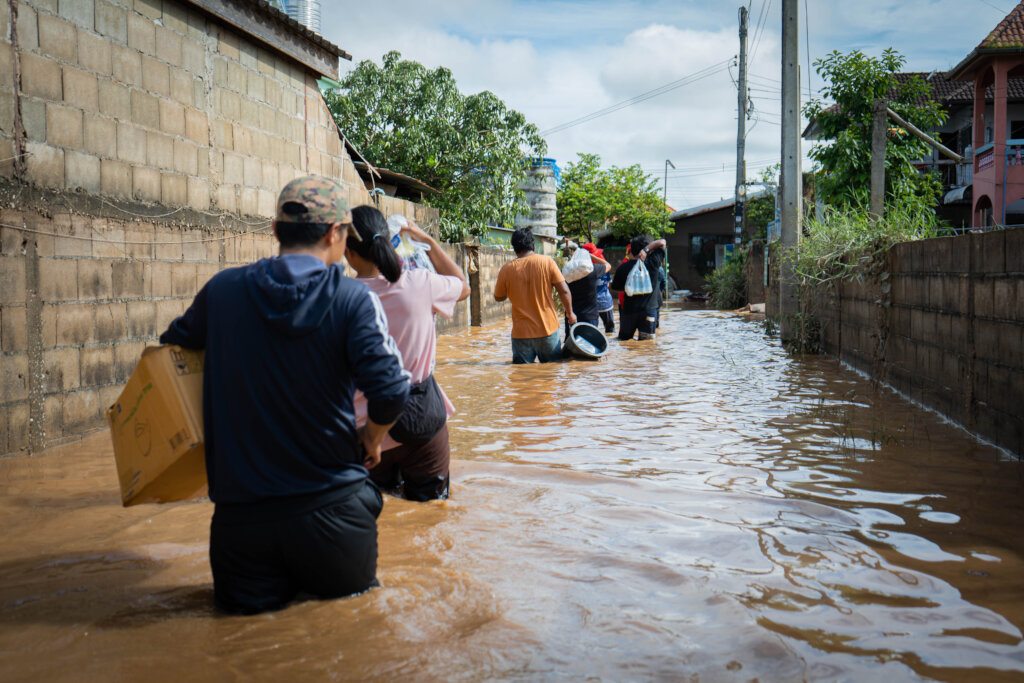By Lucy McCray | CEO
When we think of natural disasters, we often consider the immediate impact: destroyed homes, lost belongings, and disrupted lives. However, for vulnerable communities, the consequences run deeper.
In Northern Thailand, the flooding in September has left thousands of families grappling not only with physical and financial loss but with heightened vulnerability to human trafficking. In rural and border areas, where economic hardship and lack of resources are already a challenge, these floods have worsened the risk of exploitation in heartbreaking ways.
Flooding Devastates Local Agriculture, Forcing Families Into Desperate Choices
In Northern Thailand, where many families depend on farming to sustain their livelihoods, floodwaters swept through several thousand rai of rice fields, wiping out entire crops. Here is how Marin, our Partnership Program Manager explained this impact: “Thousands of acres of agricultural land, particularly rice fields, were flooded, leading to a total loss of crops. The farmers in these areas often rely on loans to fund their farming operations, and when the harvest comes, they repay these loans. However, the severe damage this year means they won’t be able to repay their debts. They are left with two options: either borrow more money to try again, which will increase their debt, or turn to jobs that are often risky. With few choices available, many are likely to take on these risky jobs, including those that lead to human trafficking, such as working in call center scams or illegal casinos, that have popped up in borders in neighboring countries, where some local people have already been trafficked”.
Stateless Families Face Even More Barriers
Mae Sai District, another area hit hard by the flooding, is home to a large stateless population, including the Tai Yai and Tai Lue ethnic groups. These families struggle to access basic human rights in Thailand, including the right to land ownership, travel, healthcare, and others. These families often live along the Sai River, and as flood recovery plans progress, the government is preparing to construct a flood barrier along the riverbanks. This project could force up to 10,000 of these stateless families from their homes, leaving them even more vulnerable without a stable place to live or work. Unlike Thai citizens, stateless families are not eligible for government support or welfare benefits, which complicates their efforts to rebuild after the flood. With limited options, these families may face increased pressure to accept risky labor opportunities just to survive.
How The Freedom Story is Working to Prevent Trafficking After the Floods
In these high-risk areas, The Freedom Story is committed to providing emergency relief and longer-term support to families affected by the floods. We have already supported the community with over 2,500 hot meals, 470 survival kits, rebuilding 10 schools, and supporting over 300 families in the rebuilding process. This includes providing school uniforms, household supplies and whatever they need to restart their lives.
Our long-term approach focuses on offering safe, stable alternatives for income and education, helping families avoid the lure of exploitative jobs. By supporting these communities in times of crisis, we can help them resist the pull of trafficking and exploitation.
Thank you for joining us to make a difference for this community.
Project reports on GlobalGiving are posted directly to globalgiving.org by Project Leaders as they are completed, generally every 3-4 months. To protect the integrity of these documents, GlobalGiving does not alter them; therefore you may find some language or formatting issues.
If you donate to this project or have donated to this project, you can receive an email when this project posts a report. You can also subscribe for reports without donating.
Support this important cause by creating a personalized fundraising page.
Start a Fundraiser